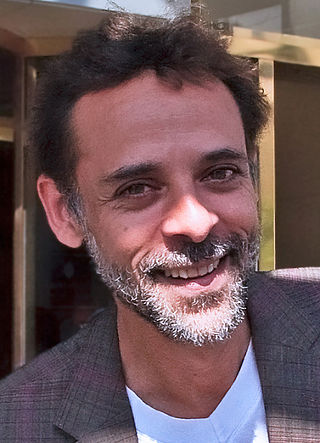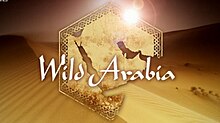
Sir Peter Markham Scott, was a British ornithologist, conservationist, painter, naval officer, broadcaster and sportsman. The only child of Antarctic explorer Robert Falcon Scott, he took an interest in observing and shooting wildfowl at a young age and later took to their breeding.

Sir David Frederick Attenborough is a British broadcaster, biologist, natural historian and author. He is best known for writing and presenting, in conjunction with the BBC Natural History Unit, the nine natural history documentary series forming the Life collection, a comprehensive survey of animal and plant life on Earth.

Julian Subatoi Bashir, MD is a fictional character from the television series Star Trek: Deep Space Nine, portrayed by Alexander Siddig. Bashir is the Chief Medical Officer (CMO) of space station Deep Space Nine and the USS Defiant.

Siddig El Tahir El Fadil El Siddig Abdurrahman Mohammed Ahmed Abdel Karim El Mahdi is an English actor and director known professionally as Siddig El Fadil and subsequently as Alexander Siddig.

Sir Wilfred Patrick Thesiger, also known as Mubarak bin Landan was a British military officer, explorer, and writer. Thesiger's travel books include Arabian Sands (1959), on his foot and camel crossing of the Empty Quarter of the Arabian Peninsula, and The Marsh Arabs (1964), on his time living with the Marsh Arabs of Iraq.
The BBC Studios Natural History Unit (NHU) is a department of BBC Studios that produces television, radio and online content with a natural history or wildlife theme. It is best known for its highly regarded nature documentaries, including The Blue Planet and Planet Earth, and has a long association with David Attenborough's authored documentaries, starting with 1979's Life on Earth.

Raymond Paul Mears is a British woodsman, instructor, businessman, author and TV presenter. His TV appearances cover bushcraft and survival techniques.

A nature documentary or wildlife documentary is a genre of documentary film or series about animals, plants, or other non-human living creatures, usually concentrating on video taken in their natural habitat but also often including footage of trained and captive animals. Sometimes they are about wildlife or ecosystems in relationship to human beings. Such programmes are most frequently made for television, particularly for public broadcasting channels, but some are also made for the cinema medium. The proliferation of this genre occurred almost simultaneously alongside the production of similar television series which is distributed across the world.

Neil Nightingale is a British freelance wildlife filmmaker, executive producer and creative consultant with over 35 years experience at the BBC. From 2009 to 2018 he was the creative director of BBC Earth, BBC Worldwide's global brand for all BBC nature and science content.
Stephen Leonard is a Northern Irish veterinarian and television personality.

Wild Down Under is a BBC nature documentary series exploring the natural history of the Australasian continent, first transmitted in the UK on BBC Two in September 2003. It was broadcast in Australia under the title Wild Australasia in February 2004.

Wild Caribbean is a four-part BBC nature documentary series exploring the natural and cultural history of the Caribbean Islands and Sea. It was first transmitted in the UK on BBC Two in January 2007. The series was produced by the BBC Natural History Unit and narrated by actor Steve Toussaint. This series also aired in Australia on ABC1 each Sunday at 7:30pm from 15 February 2009.
William Goodchild is a composer, orchestrator and conductor who produces music for film, television and the concert hall.

The Meerkats, also known as Meerkats: The Movie, is a feature-length 2008 British wildlife fiction film which anthropomorphises the daily struggles of a clan of meerkats in the Kalahari Desert. It was produced by BBC Films, and filmed by the award-winning BBC Natural History Unit. It is the debut directorial feature of James Honeyborne, previously a producer of natural history programmes for television. The worldwide premiere was held at the Dinard Film Festival, France in October 2008, expanding to a wide release the following week. The film was released in 2009, on 7 August in the UK. This was dedicated to actor Paul Newman, the narrator of the film, who died in 2008, shortly before this movie was released making it his final film role.

Madagascar is a British nature documentary series, first broadcast on BBC Two and BBC HD in February 2011. Produced by the BBC Natural History Unit and Animal Planet and narrated by David Attenborough, the three-part series focuses on the landscape and wildlife of the island of Madagascar in the Indian Ocean. Attenborough also appears briefly on camera at the beginning and end of the series. Each episode is followed by a ten-minute Madagascar Diaries segment, illustrating the techniques used to film a particular subject.
Lost Land of the Tiger is a three-part nature documentary series produced by the BBC Natural History Unit which follows a scientific expedition to the Himalayan kingdom of Bhutan. The expedition team is made up of specialist zoologists, explorers and the BBC crew. Together, they explore wilderness areas from the lowland jungles to high-elevation slopes, in search of rare animals and plants. The focus of the expedition is to investigate the status of the tiger in Bhutan, where little is known of the cat's distribution or population density. Evidence of a healthy population of tigers would elevate Bhutan's importance as a sanctuary for this endangered species. It would also support tiger conservationist Dr. Alan Rabinowitz's proposal for a vast protected corridor linking the fragmented pockets of tiger habitat which lie to the south of the Himalayas.

Africa is a 2013 British television series created by the BBC Natural History Unit. It focuses on wildlife and wild habitats in Africa, and was four years in the making. It consists of six hour-long episodes and six 10-minute-long featurettes.

Wild Brazil is a British nature documentary series, first broadcast on BBC Two and BBC Two HD in January 2014. Produced by the BBC Natural History Unit and narrated by Stephen Mangan, the three-part series focuses on three animal families, one of tufted capuchins, one of giant otters and one of South American coatis, but also looks at other animals like jaguars. Each episode is followed by a ten-minute Wild Brazil Diaries segment, illustrating the techniques used to film a particular subject.
Chris Chapman is an English television producer-director and writer, best known for his documentary Stammer School, as well as producing and directing Doctor Who documentaries, and factual series including CBBC's Our School', BBC1's Countryfile and Fantastic Beasts: A Natural History with Stephen Fry. He is the writer of Doctor Who audio drama for Big Finish.
Planet Earth is a television and film documentary franchise produced and broadcast by the BBC. The franchise began in 2001 with the success of The Blue Planet. As of 2017, The Blue Planet has spawned 5 series and one feature film.
















